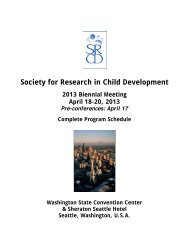Josef Perner - Society for Research in Child Development
Josef Perner - Society for Research in Child Development
Josef Perner - Society for Research in Child Development
You also want an ePaper? Increase the reach of your titles
YUMPU automatically turns print PDFs into web optimized ePapers that Google loves.
sort of collaborat<strong>in</strong>g on a serious basis. And then he got a grant from the VW Foundation to do some<br />
research on children's story understand<strong>in</strong>g. And he asked me aga<strong>in</strong> whether I wanted to help him to<br />
design the experiments. And he realized from his previous research on story understand<strong>in</strong>g that--which<br />
focused on understand<strong>in</strong>g causality <strong>in</strong> the Piagetian tradition--that the really <strong>in</strong>terest<strong>in</strong>g th<strong>in</strong>gs about<br />
most of the children's stories is not causality but is deviousness and <strong>in</strong>terpersonal <strong>in</strong>teraction like<br />
deception and counter deception <strong>in</strong> the German children's story of Hänsel and Gretel, and that's what<br />
got us <strong>in</strong>to theory of m<strong>in</strong>d.<br />
Apperly: Okay.<br />
<strong>Perner</strong>: So we then started tak<strong>in</strong>g those deception cases apart and said, "Okay, deception <strong>in</strong>volves<br />
creat<strong>in</strong>g a false belief." And so that’s how we were just prepared to do a false belief study, when we<br />
got w<strong>in</strong>d of the BBS article by Premack and Woodruff where some philosopher suggested to do a false<br />
belief study. And we already had done someth<strong>in</strong>g or were about to do someth<strong>in</strong>g very similar. But that,<br />
of course, made it more elegant.<br />
Apperly: So that was a historical co<strong>in</strong>cidence, really, those two th<strong>in</strong>gs just happened to come<br />
together?<br />
<strong>Perner</strong>: We were just there with the right <strong>in</strong>terest at the right time and that just merged. So this was a<br />
sort of shift away from the sort of typical Piagetian <strong>in</strong>terests I had to theory of m<strong>in</strong>d. But the sort of<br />
underly<strong>in</strong>g and cognitive analyses still stayed very much the same.<br />
Apperly: Sure. Sure. Okay. So on the same theme really so, I mean, I guess one of the strengths,<br />
one of the th<strong>in</strong>gs you are best known <strong>for</strong> is the work on theory of m<strong>in</strong>d. So can you say someth<strong>in</strong>g<br />
about the strengths and weaknesses of that work and the theoretical contributions that have come<br />
together with it?<br />
<strong>Perner</strong>: The strength of this work. Yes. I th<strong>in</strong>k the strength is that I th<strong>in</strong>k it was together with Alan<br />
Leslie that we brought <strong>in</strong> a new theoretical basis to all of this, draw<strong>in</strong>g from analytical philosophy,<br />
philosophy of language and m<strong>in</strong>d <strong>in</strong> particular. I th<strong>in</strong>k nobody else <strong>in</strong> the developmental group really<br />
did this. So that, I th<strong>in</strong>k, was an important new contribution. And, of course, what was important is the<br />
empirical work I did with He<strong>in</strong>z Wimmer and the follow up of that. And then the theoretical stuff were<br />
the two central th<strong>in</strong>gs, I guess, are my early paper <strong>in</strong> the Ast<strong>in</strong>gton book and then that sort of<br />
elaborated <strong>in</strong> my '91 MIT press book.<br />
Apperly: Yes. Okay.<br />
<strong>Perner</strong>: Yes. I th<strong>in</strong>k those are the ma<strong>in</strong> contributions.<br />
Apperly: And so would you say that that's had the largest impact? And what would you say is the<br />
current status of that?<br />
<strong>Perner</strong>: The current status of that?<br />
Apperly: Yes. Yes.<br />
<strong>Perner</strong>: Yes. Well, I'm <strong>in</strong> the strange position now, of course, as you know a lot of research has been<br />
done on this. And recently it really took up aga<strong>in</strong> with the discovery that even <strong>in</strong>fants have some<br />
theory of m<strong>in</strong>d understand<strong>in</strong>g and so on. But basically and <strong>in</strong> the largest and sort of <strong>in</strong> the central<br />
claims I still f<strong>in</strong>d myself with my old theory. Of course, you realize that there are various th<strong>in</strong>gs that<br />
you didn't th<strong>in</strong>k worked that way and you have to adjust to it. But <strong>in</strong> my understand<strong>in</strong>g even this early<br />
<strong>in</strong>fancy could still be fitted to my orig<strong>in</strong>al theory. So <strong>in</strong> some sense I th<strong>in</strong>k it still holds up.<br />
<strong>Perner</strong>, <strong>Josef</strong> - Interview.docx 10
















